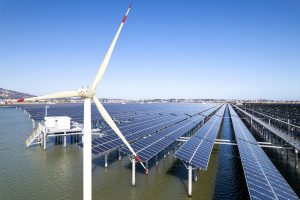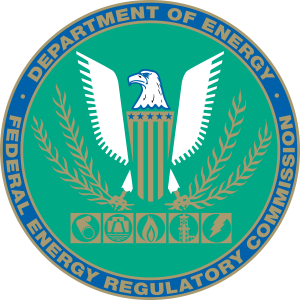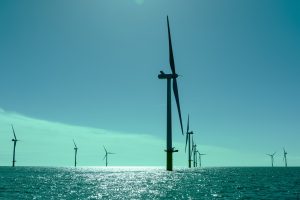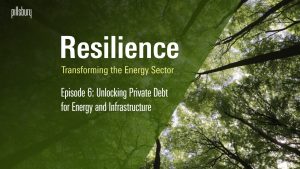In a landmark move that could shape New York’s energy landscape for decades, state officials have taken steps to both preserve its existing nuclear power facilities and significantly expand its advanced nuclear capacity. These actions are part of a broader strategy to maintain grid reliability and meet both escalating energy demand and the state’s ambitious greenhouse gas reduction and zero carbon goals.
Articles Posted in Energy
Navigating Wind and Solar Development Opportunities on State and Private Lands During Uncertain Times for Renewable Energy
 Recent executive actions and federal guidance have targeted wind and solar development, creating substantial uncertainty for the U.S. offshore wind industry and also reshaping the regulatory landscape governing onshore wind and solar development. Wind and solar projects on federal lands are now subject to heightened review processes and enhanced regulatory scrutiny. As a result, many developers are considering opportunities on state-owned and privately held lands rather than federal lands.
Recent executive actions and federal guidance have targeted wind and solar development, creating substantial uncertainty for the U.S. offshore wind industry and also reshaping the regulatory landscape governing onshore wind and solar development. Wind and solar projects on federal lands are now subject to heightened review processes and enhanced regulatory scrutiny. As a result, many developers are considering opportunities on state-owned and privately held lands rather than federal lands.
Trump Administration and Mid-Atlantic Region Governors Announce Emergency Reliability Action Targeting Data Center Load Growth
On Friday, President Donald Trump—together with governors across key Mid-Atlantic Region states—announced a new initiative aimed at addressing soaring electricity demand driven by large‑scale AI and cloud‑computing data centers. This joint federal-state initiative directs the regional wholesale power grid operator, PJM Interconnection, L.L.C. (PJM)1, to conduct an emergency auction to procure additional power plant capacity aimed at enhancing reliability and stabilizing power prices. Rather than issuing an executive order, as President Trump has done over the last year to address other energy issues, today’s action was issued instead as a non‑binding Statement of Principles, signed by the National Energy Dominance Council2 and participating governors.
FERC’s New Order on Data Center Co-Location: What Utilities Need to Know
On December 18, 2025, the Federal Energy Regulatory Commission (FERC) issued a pivotal order to PJM Interconnection, the nation’s largest regional wholesale power grid operator running the transmission system in the Mid-Atlantic region. The Order intends to help reshape how large loads—especially data centers—connect to the grid in the face of massive load growth from artificial intelligence (AI) hyperscalers.
issued a pivotal order to PJM Interconnection, the nation’s largest regional wholesale power grid operator running the transmission system in the Mid-Atlantic region. The Order intends to help reshape how large loads—especially data centers—connect to the grid in the face of massive load growth from artificial intelligence (AI) hyperscalers.
The Supreme Court’s Administrative and Regulatory Law Rulings in the 2024 Term and Preview of Cases to Be Decided in Fall 2025
This post reviews the U.S. Supreme Court’s significant regulatory and administrative law decisions from the Court’s 2024 Term and previews cases on the docket for Fall 2025. While the term produced no true “blockbusters,” the Court displayed particular concern with how lower federal courts have been applying the National Environmental Policy Act (NEPA), and it clarified the already complex judicial review provisions of the Clean Air Act (CAA). At the same time, the Court declined invitations to revisit contentious issues surrounding CAA citizen suits and avoided intervening in the wave of state-law climate change litigation. Consistent with its current composition, the Court continues to take a conservative approach, closely hewing to statutory text and structure.
Our review is organized in three parts: first, environmental and energy law cases; second, administrative law rulings that delineate the boundaries of the Administrative Procedure Act (APA); third, we discuss the environmental, energy and administrative law cases the Court has agreed to hear in its October 2025 Term.
Federal Court Halts Enforcement of Texas SB 2337 Regarding Proxy Advisor Disclosure of ESG or Other “Nonfinancial” Considerations
Enacted earlier this year and scheduled to take effect September 1, SB 2337 would impose new disclosure obligations on proxy advisory firms issuing recommendations regarding Texas-based public companies, including a requirement that any recommendation based in whole or in part on environmental, social, or governance (ESG) or other “nonfinancial” considerations be accompanied by a disclaimer that such advice subordinates shareholder financial interests to other objectives. But, on August 29, 2025, Judge Alan Albright of the U.S. District Court for the Western District of Texas entered preliminary injunctions in two related cases enjoining the State from enforcing Senate Bill 2337 against Institutional Shareholder Services (ISS) and Glass Lewis, the two firms that together account for the vast majority of proxy advisory services in the U.S. While the injunctions technically apply only to the named plaintiffs, their market dominance—an estimated 97 percent of proxy advisory services—renders the orders functionally dispositive of the law’s near-term enforceability.
The 2025 Legal Horizon for U.S. Offshore Wind
 In its first nine months, the Trump administration has taken multiple actions impacting offshore wind development and generating substantial uncertainty as to the industry’s future in the United States. Those actions have placed future projects on the defensive across multiple fronts. In response, some states and project proponents have instituted plans to try to protect existing and planned projects and encourage opportunities in welcoming jurisdictions. This article recaps the extraordinary activity in this energy sector in 2025.
In its first nine months, the Trump administration has taken multiple actions impacting offshore wind development and generating substantial uncertainty as to the industry’s future in the United States. Those actions have placed future projects on the defensive across multiple fronts. In response, some states and project proponents have instituted plans to try to protect existing and planned projects and encourage opportunities in welcoming jurisdictions. This article recaps the extraordinary activity in this energy sector in 2025.
Resilience: Unlocking Private Debt for Energy and Infrastructure | Episode 6 (6.11.25)
Interior Department Streamlines NEPA, ESA, NHPA Reviews for Geothermal Energy Projects
The U.S. Department of the Interior (DOI) announced on May 30 that it will invoke emergency permitting procedures to accelerate environmental review of select geothermal energy projects, with three proposed geothermal projects in Nevada to be among the first projects to undergo expedited review.
Powering Data Centers with Nuclear Generation
The rapid growth of electricity demand from data centers has emerged as a major challenge for the U.S. power sector. Much of this demand is being driven by the deployment of large learning models (LLMs) and generative artificial intelligence (AI). These workloads require large-volume, high-uptime computational infrastructure, and correspondingly large, reliable power supplies.
 Gravel2Gavel Construction & Real Estate Law Blog
Gravel2Gavel Construction & Real Estate Law Blog



